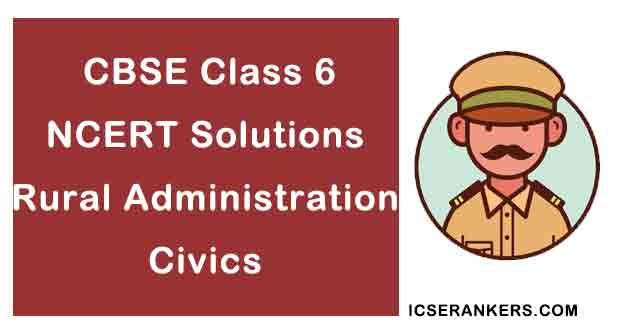NCERT Solutions for Chapter 6 Rural Administration Class 6 Civics
Rural administration consists of the government's efforts to administer the benefits provided by the state to the rural population and to govern their public affairs. A district, taluk, village, or town has different layers and divisions of authority. It supervises and controls all villages within its jurisdiction, and it enforces law and order throughout the district. The main function of rural administration is settlement of disputes, maintenance of land records, collection of revenues etc. Law and order are enforced by the police station in each area. Whenever people from an area bring a case to the police, the police register it. In such cases, it is their responsibility to inquire, investigate, and act. In villages, Kanungo and Lekhpal maintain land records. Land ownership can be determined through the maintenance of land records. Revenue collection is also a duty of Land ownershoip. The Act of 2005 is referred to as the Hindu Succession (Amendment) Act. This law allows women in India to share in their families' agricultural land and property. Every state and union territory in the country will be subject to the same law. In addition, they can take part in the property and land of the family.

Chapter Name | Rural Administration NCERT Solutions |
Class | CBSE Class 6 |
Textbook Name | Civics |
Related Readings |
|
Answer the following questions briefly.
Question 1: What is the work of the police?
Answer
Every police station has an area under its control. All persons can report cases or inform the police about any theft, accident, injury, fight etc. It is the responsibility of the police to inquire, investigate and take action on the cases within its area.
Question 2: List two things that the work of a Patwari includes.
Answer
Measuring land and keeping land records is the main work of the Patwari. Each Patwari is responsible for a group of villages.
1. The Patwari maintains and updates the records of the villages.
2. The Patwari is also responsible for organizing the collection of land revenue from the farmers and providing information to the government about the crops grown in the area.Question 3: What is the work of a tehsildar?
Answer
All states in India are divided into districts. For managing matters relating to land, these are further sub-divided. These sub-divisions are also called tehsils, taluka etc. At the top is the district collector and under him are the Revenue officers Known as tehsildar.
1. They have to hear the disputes.
2. They also supervise the work of the Patwari and ensure that the records are kept and the revenue is collected.
3. They make sure that the farmers can easily obtain a copy of their record; students can obtain their caste certificates etc.
4. The Tehsildar's office is where land disputes are also heard.
Question 4: What issue is the poem trying to raise? Do you think this is an important issue? Why?
Answer
The poem is trying to raise the issue of inequality. Often when we think of farmers who own land, we think of men. Women are seen as people who work in fields, but not as people who own agricultural land. Till recently in some states, Hindu women did not get a share in the family's agricultural land. After the death of the father his property was divided equally only among his sons.
Yes, this is an important issue because daughters should also have equal rights as the sons as everyone in the world is equal and should be treated as equal.
Question 5: In what ways are the work of the Panchayat that you read about in the previous chapter and the work of the Patwari related to each other?
Answer
The Patwari is to maintain land records of his taluka or tehsil and settle minor disputes, while the disputes that are not being solved by the Patwari are move to the Panchayat level. The Panchayat levy many taxes on people under its jurisdiction, while the Patwari is responsible for organizing the collection of land revenue from the farmers. Both, the Panchayat and the Patwari play the role of a mediator to solve the problem of its people.
Question 6: Visit a police station and find out the work that the police have to do to prevent crime and maintain law and order in their area especially during festivals, public meetings etc.
Answer
Police needs to work hard to maintain law and order of their area. The Police is responsible to lodge an FIR of a complaint and is expected to investigate the matter without any bias. During festivals, public meetings, the role of Police is very crucial as it is easy to spread violence during festivals. Hence, Police needs to be alert all the time so that the interests of all groups is protected.
Question 7: Who is in charge of all the police stations in a district? Find out.
Answer
The local police stations are headed by Station House Officer (SHO), while the Superintendent of Police (SP) is in charge of all the police stations in a district.
Question 8: How do women benefit under the new law?
Answer
In the new law, sons, daughters and their mothers can get an equal share in the land. The same law will apply to all the states and union territories. The law will benefit a large number of women. It will make the women more independent and they will have equal opportunities to live a better life. This law is a great step towards women empowerment and will prevent their exploitation to a large extent.
Question 9: In your neighborhood are there women who own property? How did they acquire it?
Answer
Yes, in my neighborhood many women own their property. Some of them have acquired it from their ancestors or forefathers while others have bought property from their own income.
